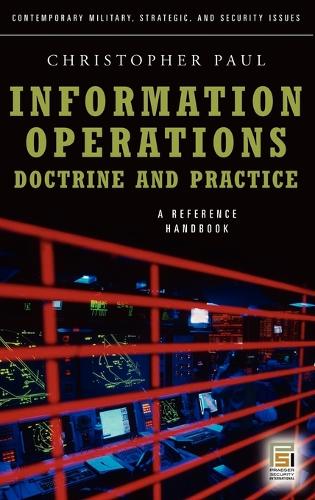
Information OperationsDoctrine and Practice: A Reference Handbook
(Hardback)
Publishing Details
Information OperationsDoctrine and Practice: A Reference Handbook
By (Author) Christopher Paul
Bloomsbury Publishing PLC
Praeger Publishers Inc
30th March 2008
United States
Classifications
General
Non Fiction
355.34340973
Physical Properties
Hardback
192
Width 156mm, Height 235mm
425g
Description
A no-nonsense treatment of information operations, this handbook makes clear what does and does not fall under information operations, how the military plans and executes such efforts, and what the role of IO ought to be in the war of ideas. Paul provides detailed accounts of the doctrine and practice of the five core information operations capabilities (psychological operations, military deception, operations security, electronic warfare, and computer network operations) and the three related capabilities (public affairs, civil-military operations, and military support to public diplomacy). The discussion of each capability includes historical examples, explanations of tools and forces available, and current challenges faced by that community. An appendix of selected excerpts from military doctrine ties the work firmly to the military theory behind information operations. Paul argues that contemporary IO's mixing of capabilities focused on information content with those focused on information systems conflates apples with the apple carts. This important study concludes that information operations would be better poised to contribute to the war of ideas if IO were reorganized, separating content capabilities from systems capabilities and separating the employment of black (deceptive or falsely attributed) information from white (wholly truthful and correctly attributed) information.
Reviews
The volume is an excellent source of information and is well presented. * ARBA *
Author Bio
Christopher Paul is a social scientist working out of RAND's Pittsburgh office. He received his PhD in sociology from UCLA in 2001. He has developed methodological competencies in comparative historical and case study approaches, quantitative analysis, and survey research. His current research interests include military influence operations, integration of air and naval forces, simulation training, press-military relations, counter-terrorism, and military operations on urban terrain.
